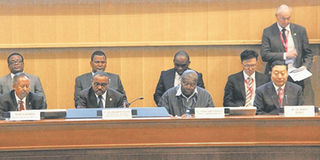Hydropower Congress opens talks in Ethopia

The opening session of the 2017 World hydropower Congress in Addis Ababa, May 9, 2017. PHOTO | NMG
What you need to know:
- Representatives from different countries including China, Taiwan, Russia, among others have shared their experience this morning following the official opening of the congress opened by the Prime Minister Hailemariam Desalegn of Ethiopia.
Addis Ababa. The World Hydropower Congress opened in Addis Ababa, Ethiopia yesterday morning discussing how Africa can learn from the rest of the world and utilizes its hydropower potential effectively to meet its energy starving people.
Representatives from different countries including China, Taiwan, Russia, among others have shared their experience this morning following the official opening of the congress opened by the Prime Minister Hailemariam Desalegn of Ethiopia.
“Through this meeting we hope to rich consensus for hydropower development in Africa… Financing marketing and construction are the bottlenecks for developing huge Africa’s hydropower potential. We can construct transmission lines which covers thousands of miles. Through multinational support and global financing,” said Zhou Yuanbing, Deputy Director of China’s Economic and Technical Research Center.
Reports show that out of the total of around 1.2 billion people in the world who have no access to electricity, half of them live in Africa.
“When we meet every two year for this important conference, we challenge each other to find solutions for a better hydropower development and interconnection of the world,” said Ken Adams, President of International Hydropower Association.
According to the Acting Executive Secretary of the United Nations Economic Commission for Africa for Africa (UNECA), Dr. Abdalla Hamdok, and Africa should take cautious approaches while undertake hydropower development giving special attention to the social and environmental impact.
“Addressing the energy infrastructure gap is considered as one of the priorities of many African governments, development partners and other relevant African institutions.
However, it is equally important to guard against negative impacts of hydropower development and to pay close attention to climate resilience and social inclusion,” he said, mentioning evidences of such problems from experiences of Zambia and Mozambique.
With a total installed capacity of 34 gigawatts, hydropower currently provides the largest contribution of any renewable energy source in Africa.
The organizers of the conference stated that in the coming days the conference will among others emphasize environmental and social aspects during project planning and implementation stages “to better hydro in the age when resources management is more important than ever”.
The high cost for development of hydropower in Africa is also mentioned as the major challenge why the continent hasn’t fully utilized its hydropower potential. (NMG)




